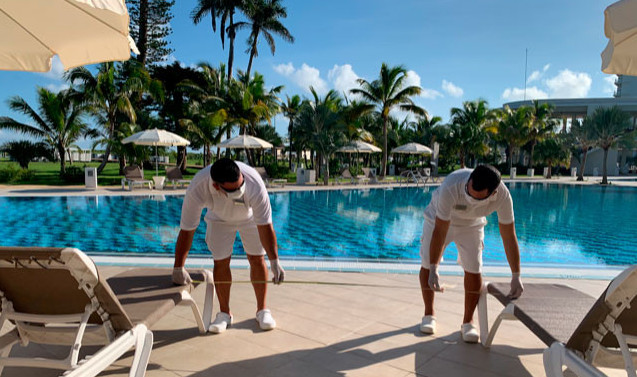On November 15 the Cuban government opened the country's borders to international travelers in order to bring back tourism, one of the engines driving the nation's economy, battered since even before the advent of the Covid-19 pandemic. Was it a rash move? Could the opening trigger a spread of the contagion? What officials could Cubans hold accountable if such an outcome unfolds?
It is not the first time that the government has sought to revive tourism during the pandemic. At first it was reluctant to close Cuba's borders, and even beckoned vacationers to take refuge from Covid-19 in Cuba, where the summery weather would, supposedly, protect them. The inevitable closure came, but after several months, at the end of 2020, the government decided to reopen the country's borders. At that time the official reports indicated 40 to 60 cases daily.
On November 15, 2020 the Cuban Ministry of Public Health (MINSAP) reported 49 new cases and 15 days later it reported 97. On December 10, 86 patients were diagnosed with Covid-19. On December 20, the positives rose to 115. By January 10, 2021, 431 cases and 2 deaths were recorded. At that point the numbers progressively rose, up to several thousand cases a day, and Cubans saw the country's hospitals overwhelmed, unable to respond to the demand for care.
At the Round Table on March 11, 2021 Deputy Minister of Public Health Carilda Peña García acknowledged that the opening of borders in November 2020 "was not without problems." At that time the official number of new infections was 778, and 4 people died on that day.
Now the number of cases and deaths from Covid-19 is steadily decreasing in the official reports. On the 15th 243 new cases were registered, almost three times the number - according to the MINSAP reports - when the borders were reopened in November 2020. On November 21 240 cases were reported.
On November 7 the Government announced a new protocol for travelers entering Cuba, eliminating mandatory quarantines and the taking of PCR tests. It now suffices to show a vaccination certificate or a negative result from a PCR test carried out 72 hours or less before travelling.
The vaccines approved by the World Health Organization (WHO), administered in most of the countries that send tourists to Cuba, have proven to be effective in reducing the number of people admitted to ICUs with Covid-19.
They do not prevent contagion, but they bolster the body's response capacity to the virus. Therefore, the Cuban Government is betting that its vaccines —not yet approved by either the WHO or the PAHO (Pan American Health Organization)— will provide Cubans with a response capacity to Covid-19 similar to that provided by Pfizer, Moderna and Janssen, among others.
Although admissions to ICUs have decreased in these countries, several are currently seeing an upturn in positives, with both vaccinated and unvaccinated patients.
In Spain, for example, the incidence rate of the coronavirus continues to rise, mainly in Catalonia, where the Covid risk figure soared over the weekend up to 200 points (100 above the threshold that epidemiologists consider indicative of high risk).
In Germany a record number of infections in one day was recorded on November 11, and the situation continues to be worrisome. The Army has deployed 12,000 troops to provide logistical support for vaccination.
Russia, which recorded a record number of infections on October 31, has seen a slight decrease in its number of infections, with 35,681 cases and 1,241 deaths in the last 24 hours.
Who will stand accountable to Cubans if this new reopening does not go well either, and the situation gets out of hand again?
For months the police and authorities have imposed disproportionate fines on Cubans for not wearing masks —which the state never provided them, or even sold— or for wearing them improperly. Accused of propagating the epidemic, many Cubans were fined and even imprisoned, without a State of Emergency having been decreed, by law a mandatory step for the application of such measures.
According to information made public by the president of the Provincial Court of Havana, Yojanier Sierra Infante, as of April 14, 2020 some 59 people had been convicted in the capital for crimes associated with the spread of the epidemic, a number that grew as contagion spread.
The same Cuban judicial system official reported, on August 28, 2020, that 70% of those sanctioned had received prison sentences. On September 17, together with the leadership of the Communist Party, he expressed concern regarding the number of people fined who could not pay the high fines set, which led to them being sentenced to prison for their failure to pay the fines imposed on them. In view of this, he suggested that the fines be payable in instalments.
To date no Cuban has sued the government for its irresponsible handling of the pandemic. The Cuban officials directly linked to the reopening of borders on November 15 are Prime Minister Manuel Marrero and Tourism Minister Juan Carlos García Granda. And it is unlikely that any Cuban will think of suing them, even if the reactivation of tourism results in disaster for the population.
If anyone decided to do so, they would run up against Section 1 of Article 657 of the current Civil and Administrative Procedure Law, which expressly states: "Excluded from administrative jurisdiction are those issues that arise in relation to provisions issued by an authority concerning: 1) national defense, State security, public order and measures adopted to safeguard the general interests… "
In addition, under the current Criminal Procedure Law, to prosecute and try a member of the Political Bureau of the PCC, authorization from the same political body is required.
Thus, while Cubans have received practically unpayable fines in the midst of the pandemic and the "Ordering Task," and even jail sentences for not wearing masks properly, the Government enjoys total impunity, even after making decisions that may have cost the lives of hundreds of Cubans.
